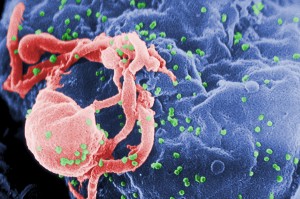The Human Immunodeficiency Virus (HIV) is notorious for its rapid evolution and elusiveness to our treatments. Our latest attempt to beat it has been foiled, yet again. As explained in this article, researchers have attempted to eliminate the virus through a genome editing technique called CRISPR-Cas9. This technique allows scientists to target a specific genetic sequence in a cell to cut, using the Cas9 enzyme and a guiding sequence, and change the function of the gene by inserting corrected/modified sequences.

HIV budding from a Lymphocyte
[Picture Source Link]
This highly versatile technique was recently applied to HIV, in an attempt to disable it and prevent further infection from it. The technique would theoretically delete HIV genetic sequences in an infected cell and prevent further virus production; however, a recent study shows that the virus evolves rapidly to avoid this treatment. The fault lies in the fact that the gene-editing technique targets a specific locus on the DNA to modify. The treatment was successful in destroying HIV genes in that area of the DNA, but the cell’s repair mechanisms allowed the removed HIV genes to be repaired with new sequences. This means that the new HIV genes will not be targeted by the CRISPR mechanism, because it contains a different marker, and the virus will live long enough to reproduce. This rapid microevolution demonstrates the power of natural selection: a predator destroys the majority of the population, but those that are adapted to survive the conditions will live long enough to reproduce and pass on its traits! HIV has eluded us once again, but we now know that the gene-editing CRISPR-Cas9 system will work, provided that we don’t miss any HIV loci…
The research looks promising, but will this be our golden ticket?
Original Article: “CRISPR/Cas9 Gene Editing Is Not Good Enough To Beat HIV: What’s Next In Humanity’s Fight Against The Deadly Disease” (Tech Times)
Original Study & Further Reading: “CRISPR/Cas9-Derived Mutations Both Inhibit HIV-1 Replication and Accelerate Viral Escape” (Cell Reports Journal)
Image Source: Wikimedia Commons


Leave a Reply